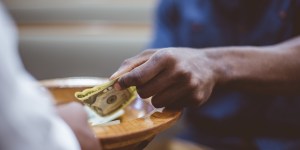Lenten Campaign 2025
This content is free of charge, as are all our articles.
Support us with a donation that is tax-deductible and enable us to continue to reach millions of readers.
On July 27, 2021, the historic trial of the "London Building" began, a short hearing during which 10 people—including Cardinal Angelo Becciu—were charged with serious financial crimes. After the summer break, the trial will resume on October 5 and is expected to dominate Vatican news for the next few months. Here are the main issues at stake in this trial, in five points.
In 2019, after an internal report, Vatican justice officials opened an investigation into the conditions of acquisition of a London building, located at 60 Sloane Avenue, by the Secretariat of State—the central administration of the Holy See. The investment, initiated in 2013, was financed with money from St. Peter's Pence Fund, that is, donations of the faithful. The operation was entrusted to an Italian-British banker, Raffaele Mincione, and appears to have been diverted from its original purpose.
After a long investigation, officials of the Vatican's Promoter of Justice office believe that it resulted in an estimated additional cost to the Vatican of between 76 and 166 million euros. Ten people have been summoned by the Vatican City tribunal to answer for their actions.
At the origin of the investment is Angelo Becciu, the former Substitute of the Secretariat of State (the pontiff's "number 3"), created cardinal and made "minister" of the Curia in 2018. Removed from office in September 2020 by Pope Francis, the Sardinian is now accused of embezzlement, abuse of office, and subornation.
He will first have to explain under what conditions he authorized the financial operation. But that's not all: the recruitment of Cecilia Marogna, a specialist in "informal diplomacy," raises questions, as does a potential diversion of funds to Sardinia. While the precise involvement of the deposed cardinal is unclear today, his indictment is in itself a historic event. As a result of a recent reform by Pope Francis, he is indeed the first cardinal to be tried by a civil court, which is a strong sign of the process of reform of the Vatican's justice system undertaken by the pontiff.
In addition to the case of Cardinal Becciu, the trial will be an opportunity to examine the very discreet "Section for General Affairs" or "First Section" of the Secretariat of State, which he headed for a long time. Mauro Carlino and Fabrizio Tirabassi, members of this powerful and opaque central administration, are under investigation. Their links with Italian, Swiss and English business circles, as well as with the Holy See's financial bodies, such as the ASIF (Supervisory and Financial Information Authority), will be investigated.
The extensive dossier accompanying the summons to the Promoter of Justice speaks of a real "system" of corruption at the heart of the world's smallest state, but also reveals a certain incompetence at the highest level. Although Pope Francis' program of reform of Vatican finances seems to have pre-empted the trial—the First Section, for example, was deprived of all economic power last December—this trial will nevertheless also be the trial of the modus operandi of this high Vatican administration.
While the pontificate of Pope Francis is described by some as a movement of modernization and renewal for the Catholic Church, the affair of the London building reminds us of an unfortunate tradition in the Vatican: that of financial scandals. They’ve been a regular evil for almost 40 years, from the scandal of the Ambrosiano bank—used by the mafia—to the recent condemnation of the president of the Institute of the Works of Religion (the Vatican's private bank) last January. These incidents, which were thought to be forgotten, have strangely reappeared from limbo after the indictment of Cecilia Marogna. The address book of this advisor to Cardinal Becciu, mischievously referred to by the Italians as "Lady Cardinal," contains the names of disreputable personalities, in particular some members of the famous "P2 Lodge" (tied to the Ambrosiano scandal) or the Cosa Nostra's gunmen...
The trial promises to be a decisive moment for the credibility of the Catholic Church and the pontificate of Pope Francis. First of all, financially: in addition to the direct losses, which are very directly detrimental to the proper functioning of a Holy See, which is in financial difficulty, the use of the faithful's money in the operation—later reimbursed by the Holy See—is an aggravating factor. The Vatican is afraid that the laity, by dint of scandals, will stop financing the Holy See... And in fact, a decrease in donations is already observable.
From another perspective, the fate of Cardinal Becciu, a personal friend of Pope Francis, puts at stake the credibility of the latter's action against the "scourge" of clericalism, the hierarchical rigidity in the Church that the pontiff has never ceased to fight.
The credibility of his administration will also be widely examined, especially as the promulgation of a new constitution to reform the Curia approaches. But more symbolically, it is above all the moral credibility of the Catholic Church that is at stake here. The great inconsistency between Pope Francis’s exhortations against globalized finance and the mafia-like excesses observed closer to the Throne of Peter seems hardly tenable.



